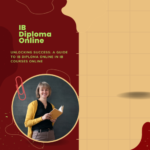Introduction:
International Baccalaureate (IB) Math courses are known for their rigor and depth, demanding a significant commitment of time and effort from students. Effective time management is crucial for success in IB Math, especially for students dealing with the pressures of a busy academic schedule. In this article, we will explore practical time management hacks to help busy IB Math students balance their studies, extracurricular activities, and personal life, ensuring a well-rounded and successful academic experience.
- Create a Detailed Schedule: Start by creating a detailed schedule that includes all your commitments, including classes, extracurricular activities, and personal obligations. Break down your day into specific time slots, allocating dedicated periods for IB Math Tutors in China study sessions. A well-structured schedule provides a visual roadmap, making it easier to identify and utilize available time.
- Prioritize Tasks: Identify and prioritize tasks based on urgency and importance. Focus on high-priority items first, such as pending assignments, upcoming tests, or challenging topics. This approach ensures that critical tasks are addressed promptly, reducing the risk of last-minute cramming and stress.
- Utilize Productivity Tools: Take advantage of productivity tools and apps to streamline your study routine. Calendar apps, task managers, and note-taking apps can help you stay organized and on top of deadlines. Set reminders for important dates, assignments, and exams to avoid overlooking crucial elements of your IB Math tutors.
- Break Down Larger Tasks: Break down larger tasks into smaller, more manageable segments. Instead of trying to tackle an entire chapter in one sitting, divide the material into sections. This approach not only makes studying more manageable but also provides a sense of accomplishment as you complete each segment.
- Establish a Dedicated Study Space: Create a designated study space that is free from distractions. Whether it’s a quiet corner in the library or a desk in your room, having a consistent study environment helps signal to your brain that it’s time to focus. Minimize interruptions by turning off notifications on your phone and other electronic devices.
- Use the Pomodoro Technique: The Pomodoro Technique involves breaking your study time into focused intervals, typically 25 minutes, followed by a short break. After completing four cycles, take a longer break. This method helps maintain concentration and prevents burnout, making your study sessions more efficient.
- Stay Flexible: While having a schedule is essential, it’s equally important to stay flexible. Unexpected events or additional commitments may arise, so be prepared to adjust your schedule accordingly. Having a flexible mindset allows you to adapt to changes without feeling overwhelmed.
- Set Realistic Goals: Establish realistic and achievable study goals. Instead of aiming to master an entire topic in one session, set specific, attainable objectives. This could include understanding a particular concept, completing a set number of practice problems, or reviewing class notes.
- Eliminate Multitasking: Focus on one task at a time to enhance concentration and understanding. While multitasking may seem efficient, it often leads to reduced productivity and comprehension. By giving your full attention to one task, you can complete it more effectively and move on to the next with a clearer mind.
- Delegate When Possible: If you’re part of a study group, consider dividing responsibilities. Delegate tasks such as summarizing sections of the textbook, creating practice quizzes, or explaining concepts to peers. Collaborative learning not only lightens the workload but also reinforces your understanding through teaching.
- Incorporate Active Learning Techniques: Engage in active learning methods to make your study sessions more effective. Instead of passively reading through notes, try solving problems, teaching concepts to yourself, or creating flashcards. Active learning promotes better retention and understanding of the material.
- Practice Mindfulness: Incorporate mindfulness and relaxation techniques into your routine. Take short breaks to stretch, practice deep breathing, or engage in quick meditation sessions. These moments of mindfulness can help reduce stress, improve focus, and enhance overall well-being.
- Review and Reflect: Periodically review your time management strategies and assess their effectiveness. Reflect on what worked well and what could be improved. Being mindful of your study habits allows you to make continuous adjustments, optimizing your time management approach.
- Seek Support When Needed: Don’t hesitate to seek support from teachers, classmates, or IB Math Tutors in Poland when you encounter challenges. Discussing difficult concepts with others can provide new perspectives and clarity. Additionally, reaching out for help when needed prevents the accumulation of confusion and stress.
- Maintain a Healthy Lifestyle: Prioritize self-care by maintaining a healthy lifestyle. Ensure you get sufficient sleep, eat nutritious meals, and engage in physical activity. A healthy body and mind are better equipped to handle the demands of IB Math studies.
Conclusion:
Successfully managing time as a busy IB Math student requires a combination of planning, prioritization, and adaptability. By creating a detailed schedule, prioritizing tasks, and utilizing productivity tools, you can optimize your study routine. Incorporating active learning techniques, staying flexible, and maintaining a healthy lifestyle further contribute to a balanced and effective approach. Remember, effective time management is a skill that can be developed and refined over time, and finding the strategies that work best for you is a continuous process. With these time management hacks, busy IB Math students can navigate their academic journey with confidence and success.



